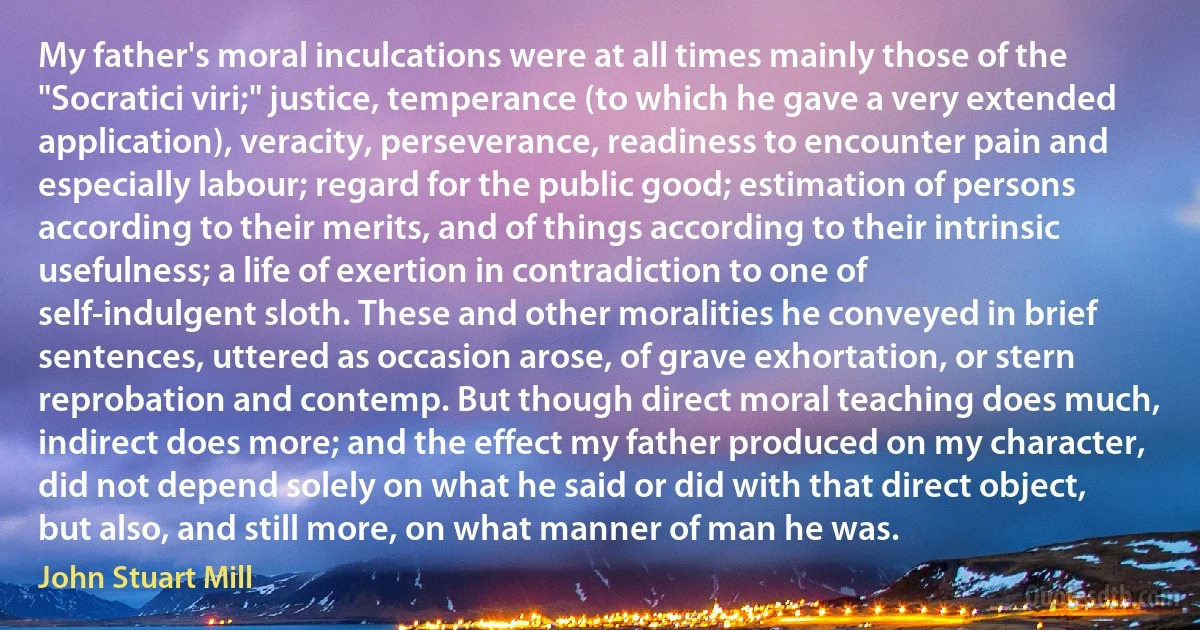
My father's moral inculcations were at all times mainly those of the "Socratici viri;" justice, temperance (to which he gave a very extended application), veracity, perseverance, readiness to encounter pain and especially labour; regard for the public good; estimation of persons according to their merits, and of things according to their intrinsic usefulness; a life of exertion in contradiction to one of self-indulgent sloth. These and other moralities he conveyed in brief sentences, uttered as occasion arose, of grave exhortation, or stern reprobation and contemp. But though direct moral teaching does much, indirect does more; and the effect my father produced on my character, did not depend solely on what he said or did with that direct object, but also, and still more, on what manner of man he was.
John Stuart MillRelated topics
character contradiction exhortation father good grave intrinsic justice life man occasion pain perseverance public say sloth teaching times veracity things labourRelated quotes
[T]he last 15 years have witnessed the ascent of an alternative view, that of embodied or enactive cognition. This new wave arose because the computationalist doctrine failed to account even for the most elementary coping with the world: walking, perceiving object in a natural setting, imagination. Slowly the cards turned into considering that the basis of mind is the body in coupled action, that is, the sensory-motor circuits establish the organism as viable in situated contexts. From this perspective the brain appears as a dynamical process (and not a syntactic one) of real time variables with a rich self-organizing capacity (and not a representational machinery). So in this sense the mind is not in the head since it is roots in the body as a whole and also in the extended environment where the organism finds itself.

Francisco Varela
Man experiences a multitude of needs, on whose satisfaction his happiness depends, and whose non-satisfaction entails suffering. Alone and isolated, he could only provide in an incomplete, insufficient manner for these incessant needs. The instinct of sociability brings him together with similar persons, and drives him into communication with them. Therefore, impelled by the self-interest of the individuals thus brought together, a certain division of labor is established, necessarily followed by exchanges. In brief, we see an organization emerge, by means of which man can more completely satisfy his needs than he could living in isolation.This natural organization is called society.The object of society is therefore the most complete satisfaction of man's needs. The division of labor and exchange are the means by which this is accomplished.

Gustave de Molinari
The Age that admires talk so much can have little discernment for inarticulate work, or for anything that is deep and genuine. Nobody, or hardly anybody, having in himself an earnest sense for truth, how can anybody recognize an inarticulate Veracity, or Nature-fact of any kind; a Human Doer especially, who is the most complex, profound, and inarticulate of all Nature's Facts? Nobody can recognize him: till once he is patented, get some public stamp of authenticity, and has been articulately proclaimed, and asserted to be a Doer. To the worshipper of talk, such a one is a sealed book. An excellent human soul, direct from Heaven,-how shall any excellence of man become recognizable to this unfortunate? Not except by announcing and placarding itself as excellent,-which, I reckon, it above other things will probably be in no great haste to do.

Thomas Carlyle
I shall never cease from the practice and teaching of philosophy, exhorting anyone whom I meet after my manner, and convincing him, saying: O my friend, why do you who are a citizen of the great and mighty and wise city of Athens, care so much about laying up the greatest amount of money and honor and reputation, and so little about wisdom and truth and the greatest improvement of the soul, which you never regard or heed at all? Are you not ashamed of this? And if the person with whom I am arguing says: Yes, but I do care: I do not depart or let him go at once; I interrogate and examine and cross-examine him, and if I think that he has no virtue, but only says that he has, I reproach him with overvaluing the greater, and undervaluing the less. ...For this is the command of God, as I would have you know...

Socrates
From his high pedestal, Prof. Sharma could afford to disregard the 'very few authors whose work effectively addresses the feudalism thesis in a critical manner', and he 'appears to have been in no mood to take heed of criticism levelled at his work'. This disregarding and ignoring of counter-evidence is tactically the best way to prolong your dominant position (which is why this tactic was adopted by most secularists in the Ayodhya debate): it denies publicity and respectability to the critic's alternative thesis. But to the progress of science, this upholding of dogma and suppression of debate is detrimental. According to Prof. Wink, the effect has been this : 'Under the impact of the feudalism thesis the historiography of the period is still in utter disarray.'

Koenraad Elst
